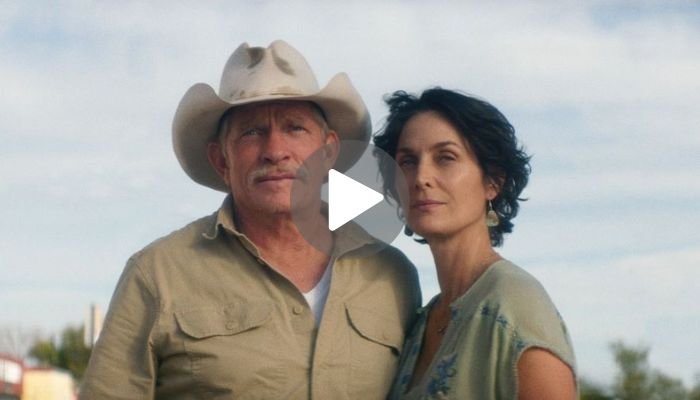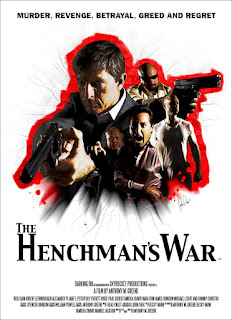
If someone says to you “they don’t make them like they used to,” send them the link to “Accidental Texan.” You won’t be able to watch it, because it doesn’t exist — at least, not in this timeline. If you could, though, you’d likely mistake this film for a feel-good family feature from the mid-’70s that just got dug up out of the vault and dusted off a little.
Back then, Brian Keith would have played Thomas Haden Church’s role and Kurt Russell would’ve been Rudy Pankow’s character. But in this timeline (the one where Brian Keith is not available), Church plays Merle, a roughneck oil driller who sees his opportunity for redemption in the form of Erwin (Pankow), a Harvard dropout actor on his way back home.
When a Harvard dropout’s (Rudy Pankow) first big break as an actor goes awry in explosive fashion — literally; he fails to silence his cellphone before shooting a dramatic movie scene that calls for multiple squib-triggered bullet hits — he finds himself unemployed and at odds with his future in showbiz.
So he does what any stranded small-town Texas traveler lacking funds for car repairs would do: He relies on the kindness of strangers. First among them is Faye (Carrie-Anne Moss), the sympathetic proprietor of Buffalo Gap’s lone diner. Second among them is Merle (Thomas Haden Church), a cantankerous veteran roughneck whose introduction doubles as a mission statement: “I punch holes in the earth like a badass.”
Merle’s particular brand of hole-punching hasn’t been fruitful lately — too many dry wells; too few paying customers — so now he punches holes wherever he damn well pleases. Unfortunately, here lately where he pleases has turned out to be right atop some very lucrative pipelines belonging to some very powerful people. Now Merle’s on the verge of bankruptcy, and — what’s worse — foreclosure by a mean old banker (Bruce Dern).
To avoid such a fate, Merle needs to round out his crew with a good enough actor who can pass as a seasoned landman long enough to convince creditors he’s on the brink of striking black gold. In other words: He needs someone smart enough to read books, stupid enough to believe them and Harvard enough to do both.
Enter Erwin. The rest is … well, you know.
Church and Pankow convincingly create a funny back-and-forth, especially when their characters are hoodwinking gullible opponents, and are equally compelling as they shift into more serious exchanges about painful parts of their respective pasts. (Years ago Merle lost his son in a car accident; Erwin worries that he’ll let down his tradition-bound father by leaving Harvard for Hollywood.) A born Texan with real-life oilfield experience and his own Lone Star State ranch, Church is at his best here, fully inhabiting a role that finely balances the wisdom and sorrow of many years spent pursuing dreams that rarely come true — and articulating an almost inexhaustible wellspring of needful ambition. If sometimes he crosses over into desperate territory, well, that’s just what Merle might be expected to do at this point.
Pankow goes from fish-out-of-water cynic to indispensible fellow traveler and, when required, spirit-raising cheerleader without missing a beat. It’s mildly surprising that Erwin isn’t given some kind of romantic interest in scripter/producer Julie B. Denny’s nimble adaptation of Cole Thompson’s novel “Chocolate Lizards” (the film’s original title during its festival run). To some extent Merle is luckier — he generates low-key sparks of attraction with Faye even if they never get around to any serious smooching or whatever. (Not that such a development would strain credulity, because really, what reasonably sentient straight male could resist Moss’ earthy allure?)
Dern drops by now and then to give the proceedings a welcome jolt of vinegar as Scheermeyer, the grizzled rancher who’s long since past fed up with people wanting to drill on his possibly oil-rich land — and requires a good deal of persuading before signing on with Merle and Erwin. It’s easily the veteran actor’s best work since the underseen and underrated 2019 drama “The Artist’s Wife.”
“Accidental Texan” Prior known for his storyboarding skills on various in-demand action toons, Bristol shows a keenly observed but non-condescending appreciation for the specifics of small-town Texas life here — and keeps his film as apolitical as possible. (Bankers and big businessmen are bad guys here, but that’s an equal-opportunity stereotype.) Cinematographer Matthew Wise accordingly gives the picture a classically burnished look that subtly helps make it seem like an oldie-but-goodie if not quite the real thing.
Watch free movies on Fmovies







